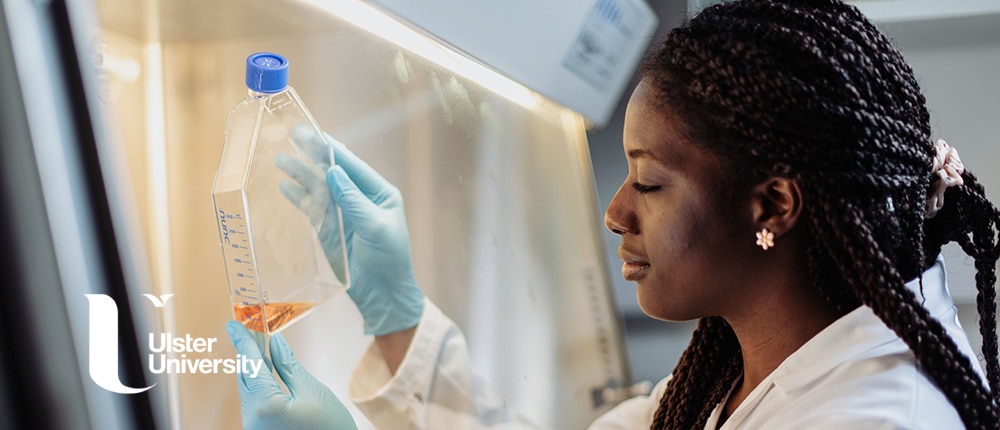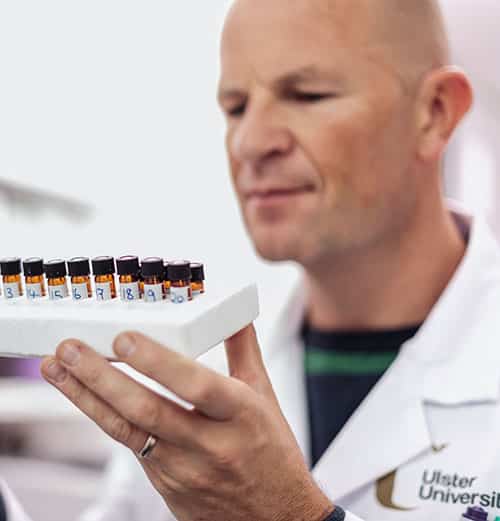Blogs
Keep up with all the latest thoughts and opinions.
We make it happen.
What Can You Do with a Master’s in Biomedical Science?
Thursday, September 16th, 2021

Ulster University aims for excellence in teaching and research standards, and our Biomedical Science distance learning MSc is a great example of these meeting these objectives.
Students on the programme learn a range of in-depth biomed skills and theoretical concepts to increase their existing knowledge.
But when it comes to graduating, what can you do with a master’s in Biomedical Science?
In this article we present the career prospects and progressions for our postgraduates from the Life Sciences department.
Career options with a Biomedical Science Masters
If you’re considering a Biomedical Science MSc online, the likelihood is you already have a biological science-related qualification and you’re working in a healthcare-relevant field.
So the real question is: what advantages are there in gaining an MSc on top of your existing experience and undergraduate biomed degree?
Let’s explore the kinds of jobs you might be in already, then discuss how an IBMS-accredited Masters degree can improve your career prospects.
Jobs after a Biomedical Science Masters
Popular roles for those with a Biomed qualification include:
- Biomedical scientist
- Forensic scientist
- Clinical scientist
- Medicinal chemist
- Analytical chemist
- Nurse
- Biochemist
- Medical scientist
- Laboratory technician
- Toxicologist
- Microbiologist
- Research scientist
- Biotechnologist
But according to Prospects, about a third of Biomedical Science graduates go straight into further study or a combination of study and work together. That could well be because your career prospects and salary are likely to be significantly improved if you earn a higher qualification – especially on an IBMS-accredited MSc.
Becoming a Biomedical Scientist
One of the most obvious career paths for graduates with a biomed degree is a Biomedical Scientist job.
Biomedical Scientists use their understanding of the human body and pathology to test fluids and tissues in order to diagnose and treat disease.
How much does a biomedical scientist make?
If you go straight from your BSc into a Biomedical Scientist job in the NHS (one of the UK’s largest employers of Biomedical Scientists) you’ll likely earn a starting salary in the region of £24,000 to £30,000. Many graduates will choose to specialise in order to progress up the structured pay banding system in the NHS.
To work your way up to around £37,000 (band 6), £50,000 (band 7/8a) or eventually even higher as a consultant Biomedical Scientist, you’ll need to achieve more knowledge and specialist qualifications.
Beyond the NHS, there are competitively paid opportunities in a variety of private clinics, labs and medical outfits in the UK and beyond.
In the USA, the average Biomedical Scientist salary is $63,000, comparable to just over £50,000 on average in London.
You might start off earning £15-20 per hour in a freelance capacity, but an accredited MSc in Biomedical Science can help increase this rate along with your professional development.

Specialising with an IBMS accredited Biomedical Science MSc
There are several areas a Biomedical Scientist can choose to specialise in as they develop their career.
Biomedical specialisms can include:
- Cellular Science or Cell Pathology
- Clinical Biochemistry or Immunology
- Haematology or Blood Science
- Medical Microbiology
- Genetics and Molecular Pathology
- Virology
On the Ulster online Biomedical Science MSc we offer students four relevant pathways to choose from for their specialism:
- Clinical Chemistry
- Haematology
- Medical Microbiology
- Cellular Pathology
Along with the other modules on our masters programme, including a 60-credit independent Research Project, this is more than sufficient to help Biomedical Scientists progress in their chosen specialism.
Benefits for employees and employers
It’s not just you who’ll enjoy a greater understanding of biomed principles and practices. Many employers appreciate the advantages of a more educated, specialised workforce.
Health departments with skilled experts in cell pathology or epidemiology, say, might attract improved funding and a reputational boost.
Ulster University’s Biomedical Science MSc requires distance learning students to have access to a laboratory for the practical elements of the programme. Therefore, an employer who allows students to use lab facilities and a colleague to act as their practical supervisor will sometimes be open to contributing towards the cost of the master’s degree too. The educational investment is worthwhile for the organisation, employer, and the individual.
The programme features a 60-credit independent research project that students must carry out at their chosen laboratory. Often the subject chosen for this research ties in with an area of interest for their employer’s department, so this module can have tangible gains for everyone.
Furthermore, if you deal with patients or your work has an impact on health outcomes, the recipients of that healthcare will also directly benefit from your qualifications and enhanced specialisms.
What can I study after biomedical science?
Beyond career-oriented goals, studying a masters in Biomedical Sciences can open other doors. Academia and research are worthwhile and much needed routes for MSc graduates to take.
Further study, in the form of a PhD or MPhil in Biomedical Science, appeals to a proportion of students. Others go on to work in academia, teaching the next generation of Biomedical Scientists and contributing vital research at leading institutions like Ulster University.
Online Biomedical Science MSc courses expand your options
There’s no one-size-fits-all approach with a Biomedical Science MSc at Ulster. Since the programme has an IBMS accreditation, you can progress your career in biomed or other associated fields if that’s what you want.
Our course is respected and approved throughout the industry to give you the best opportunities in your professional aspirations. As a part-time distance learning programme, our masters makes it as easy as possible to study while continuing to work. You can balance life and work commitments with a totally flexible course structure and online learning platform.
If you’re looking for a Biomedical course to fulfil other goals or different careers, there’s a lot of choice for postgraduates from our programme.
Whether you study for two years or spread it out over longer, our Student Success advisors will support you throughout and can offer you excellent careers advice.
See our MSc Biomedical Science page to find out more about the programme, its specialisms, and the opportunities available with the new skills and knowledge you’ll learn from our UK top 5-rated faculty.


